|
AWARDS AND TEARS |
 |
|
Kate Winslet
has won two Golden Globe awards in one of the
best nights for British talent in recent memory.
The Reading-born actress, 33, picked up gongs
for best supporting actress for The Reader, in
which she plays former Nazi guard who has an
affair with a younger man, and for best actress
for her role as a frustrated suburban housewife
in Revolutionary Road. The actress was rendered
speechless by the second win – one of the more
unexpected of the night. "Is this really
happening," she asked in an emotional address
that paid tribute to her "spectacular" co-star,
Leonardo DiCaprio,
and to her husband, Sam Mendes, who directed the
film. |
|
SECOND WAVE OF BANKING CRISIS HITS
STERLING |
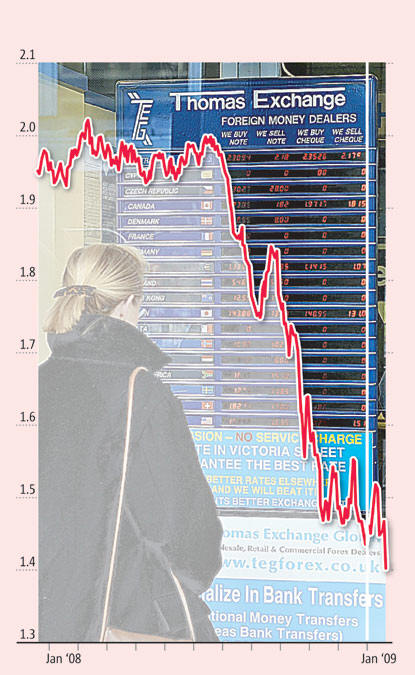 |
|
SEEN
FROM SPACE |
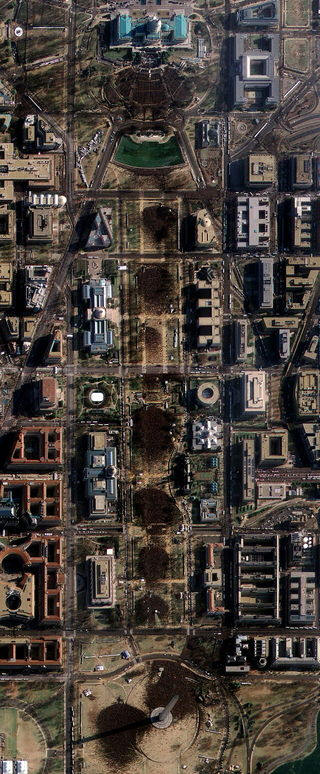 |
|
This band
incarnates the traditional
values of Cajun music in the
USA. The Cajuns live mainly in
Louisiana and are the
descendants of Acadian exiles.
Today, the Cajuns make up a
significant portion of south
Louisiana's population, and have
exerted an enormous impact on
the state's culture. |
|
 |
|
Every now
and again a band comes along that
redefines a genre of music and carries
it even further...that group is Dennis
Stroughmatt and Creole Stomp.
Always leaving audiences wondering "who
are they?," and "where do they come
from?," Dennis and CS are based in
southern Illinois and happily tell
audiences "we are from upper Louisiana."
While this may bring chuckles from many
and nodding heads from others "in the
know," this is the group that does
represent "old upper Louisiana." Dennis
learned to speak French and play French
Creole music in a southeast Missouri
French Creole community before moving to
the state of Louisiana. After
returning to Illinois from Louisiana,
Dennis began a long odyssey that
eventually culminated in the forming of
Creole Stomp in 2002. And since that
time he and his band have carried the
torch of French Creole music and culture
across North America performing a
blend of music from the state of
Louisiana and old upper Louisiana.
Their unique sound and mix of ancient
and modern Mississippi River valley
musical tradition positions them as the
only band to encompass French Creole and
Folk Music from the entirety of the old
Louisiana Territory. And although
Dennis continues to play with many of
his Louisiana based friends on occasion,
you can always find him at the helm of
Creole Stomp playing
somewhere from San Diego to Boston |
 |
|
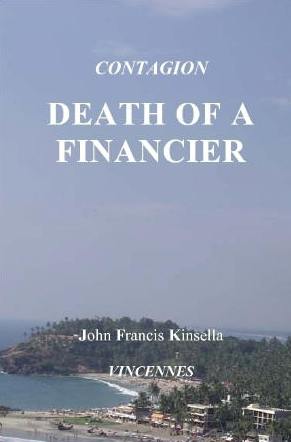
|
Read DEATH OF
A FINANCIER by
JOHN FRANCIS KINSELLA |
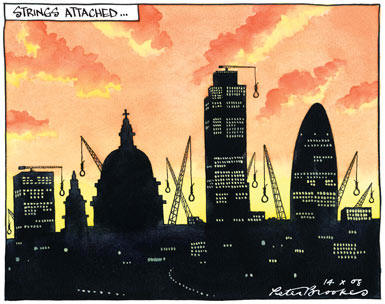
|
Tom Barton, a City
mortgage broker, decides
to quit his business in
the wake of the subprime
crisis and arrives in
Kovalam, in the south of
India. In the Maharaja
Palace he finds himself
in the company of
holiday makers from the
UK, Scandinavia and
Russia. Stephen Parkly,
the CEO of a successful
City bank, and his young
wife Emma are taking a
well earned year end
break. Parkly falls
gravely ill with a
mysterious infection,
whilst back in the City,
unknown to him his
mortgage and investment
bank, West Mercian
Finance is in grave
difficulties. Ryan
Kavanagh, a doctor,
comes to Emma’s aid with
the help of Barton,
after an attempted
cover-up by the Indian
authorities, who fear
for their tourist
industry and more
especially medical
tourism, as the disease
threatens the resort
with the tourist season
in full swing. Thousands
of British tourists
enjoying the sun are
unaware of the pending
disaster, many are
equally unaware their
savings about are to be
wiped out in the West
Mercian collapse. |
|
OR PRINT
VERSION
FROM
| More books by John Francis Kinsella from Vincennes Books: Borneo Pulp, The Legacy of Solomon, Offshore Islands, The Lost Forest |
|
|
|
|
LONDON TO TIMBUKTU BY
FLYING-CAR |
 |
|
A voyage to fabled
Timbuktu in a flying car
may sound like a magical
childhood fantasy.
But this week a British
adventurer will set off
from London on an
incredible journey
through Europe and
Africa in a souped-up
sand buggy, travelling
by road - and air. With
the help of a parachute
and a giant fan-motor,
Neil Laughton plans to
soar over the Pyrenees
near Andorra, before
taking to the skies
again to hop across the
14-km (nine-mile)
Straits of Gibraltar.
The ex-SAS officer then
aims to fly over the
Atlas Mountains in
Morocco, above stretches
of the Sahara desert
and, well, wherever else
the road runs out. But
forget Chitty Chitty
Bang Bang - this flying
machine is based on
proven technology.
|
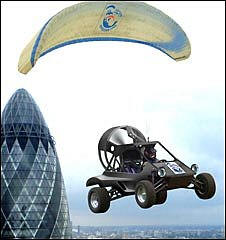 |
|
Lakeview Terrace |
A gripping film
about neighbourly
hate that inverts
racial stereotypes.
Next door neighbour,
(Eddie Murhpy)
presents himself:
“I’m your worst
fucking nightmare,
man. I’m a nigger
with a badge.” When
Chris and Lisa
Mattson, a nice
mixed-raced couple,
move into their
dream home on a
quiet cul-de-sac in
southern California,
they discover their
worst nightmare
lives next door: a
black cop with a
badge and a hatred
of mixed-race
couples. Lakeview
Terrace belongs to
that genre of
thrillers — Unlawful
Entry, Fatal
Attraction — in
which good, white,
well-off
middle-class people
have their lives
invaded by former
lovers, lunatics or
the neighbour(s)
from hell.
|
|
|
|
CHINESE GROWTH ZERO? |
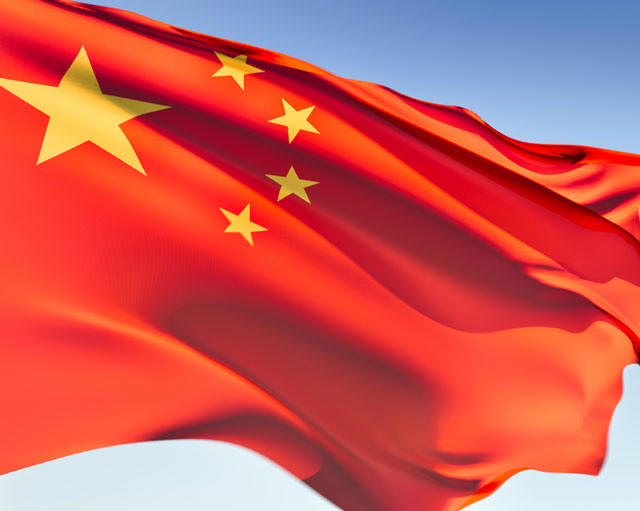
|
Although the
annual rate of
growth was
6.8pc,
economists
speculated that
the actual
growth between
September and
December last
year could have
been zero, or
even negative.
The annual rate
of growth for
the world's
third-largest
economy was the
lowest since the
second quarter
of 1998. "The
international
financial crisis
is deepening and
spreading with a
continuing
negative impact
on the domestic
economy," said
Ma Jiantang,
head of the
statistics
bureau. In
China, much of
the slowdown has
been blamed on a
lack of demand
from the rest of
the world for
Chinese-made
goods. Wen
Jiabao, the
prime minister,
said earlier
this week that
the outlook for
Chinese
employment is
"very grim" as
factories shut
down and foreign
companies rein
in their
spending.
Mr Wen will
visit the UK
next week, and
Gordon Brown has
already called
upon him to make
sure that China
plays its part
in stabilising
the global
economy. "We
need China to
play a full
role, in
partnership with
us, if we are to
restore
confidence,
growth and
jobs," said Mr
Brown. China,
however, has
insisted that it
must get its own
house in order
first, and there
are indications
that the
government has
already
instructed banks
to unleash
credit into the
market. The
value of loans
issued in
November and
December soared
by nearly 19pc.
"It is hard to
overestimate the
potential
importance of
this," said Mr
Green. "Mature
economies'
banking systems
are currently
flooded with
liquidity that
is not being
lent out.
China's
interbank market
is similarly
flooded, but the
difference is
that the banks
are lending."
The banks are
likely to be
ordered to
finance a large
chunk of the
Pounds400
billion fiscal
stimulus package
that the Chinese
government
announced in
November. There
is a further
Pounds2 trillion
of spending
demands from
local
governments
across China
that they may
also be called
upon to help
with,
irrespective of
the possibility
of bad loans.
China was not
alone in its
difficulties
Japanese
exporters also
endured a hard
December as
demand for a
range of goods
fell sharply.
Exports to the
US fell 26pc,
those to Europe
dropped 41.8pc
and those to
China were down
35pc.
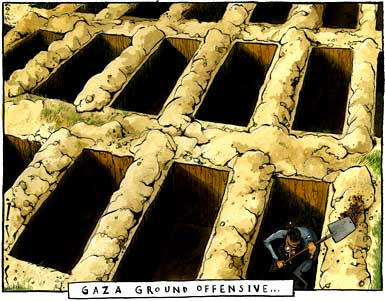 |
|
Nevertheless,
the
International
Red Cross
continues to
meet with the
relevant Israeli
authorities to
persuade them of
Israel's
international
obligations as a
signatory to the
convention. Eloi
Fillion,
protection
coordinator of
the
International
Committee of the
Red Cross,
explained to the
Middle East
Times that his
organization
also holds
regular
workshops on
principles of
international
humanitarian law
for Israeli
security
personnel and
members of the
IDF, which he
says are
positively
received. But,
he said, there
was only so much
that groups like
his could do, as
ultimately the
protection of
Palestinian
civilians lay in
a negotiated
settlement.
"Until there is
a political
settlement to
the
Palestinian-Israeli
conflict,"
Fillion said,
"the majority of
casualties will
continue to be
civilian, who
will also bear
the brunt of the
suffering."
|
|
|
MIDDLE EAST
FACTS
|
|
On 29 November
1947, the
United Nations
General Assembly
voted 33 to 13,
with 10
abstentions, in
favour of the
Partition Plan,
while making
some adjustments
to the
boundaries
between the two
states proposed
by it. Switching
their votes from
November 25 to
November 29 to
provide the
two-thirds
majority were
Liberia, the
Philippines, and
Haiti. All
heavily
dependent on the
United States,
they had been
lobbied to
change their
votes. The State
Department noted
that it had been
shown that
unauthorized
U.S. pressure
groups,
including
members of
Congress, sought
to impose U.S.
views on members
of foreign
delegations. At
that time Israel
as a state did
not exist and
the UN was
composed of only
54 nations and
all Middle East
members voted
against the
resolution,
whilst South
Africa, then
under apartheid,
was the only
African nation
to vote for the
resolution,
since there was
no other African
member state,
except Egypt who
voted against.
Since that time
the total member
states risen to
192. It is of
course difficult
to change
history and past
resolutions, but
some
consideration
should be given
to the changes
that have taken
place in the
world whilst
protecting the
position of
Israel, as well
as the
Palestinian
people - a small
and weak nation
facing a
regional
superpower. |
|
I'll be gone
before Obama
finishes term,
says Fidel
Castro |
|
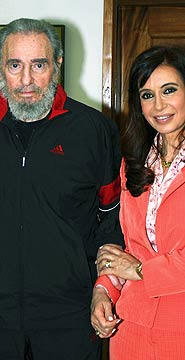 |
THE INDEPENDENT NEW YORK
TIMES PRESENTS SEASONAL
GREETINGS TO ALL ITS
READERS
PLEASE LET US HAVE
YOUR COMMENTS AND
OPINIONS
CONTACT OUR EDITOR AT
sumpinein@gmail.com |
|
|
|
Caroline
Kennedy
announced
early
Thursday
that she
was
withdrawing
from
consideration
for the
vacant
Senate
seat in
New
York,
startling
the
state’s
political
world
after
weeks in
which
she was
considered
a top
contender
for the
post. |
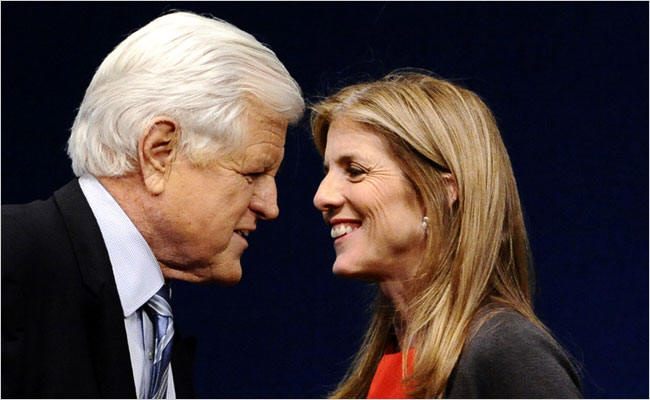 |
|
Ms. Kennedy on
Wednesday called
Gov.
David A.
Paterson,
who will choose
a successor to
Senator
Hillary Rodham
Clinton,
to inform him
that she was no
longer
interested. “I
informed
Governor
Paterson today
that for
personal reasons
I am withdrawing
my name from
consideration
for the
United States
Senate,”
Ms. Kennedy said
in a statement
released by her
public relations
firm. Ms.
Kennedy did not
elaborate, but a
person who spoke
to her suggested
that her
concerns about
the health of
her uncle,
Senator
Edward M.
Kennedy,
who suffers from
brain cancer and
was hospitalized
after a seizure
on Tuesday,
contributed to
her decision.
Ms. Kennedy
believed that
the job was hers
if she would
accept it, the
person said, but
aides to Mr.
Paterson would
not comment on
whether that was
true. |
 |
|
Laurent Nkunda,
the Congolese
general who has
been fighting a
bloody war
against the
government was
arrested last
night in
neighbouring
Rwanda, the
chief of police
in the
Democratic
Republic of
Congo said in a
statement on
Friday. The DR
Congo army and
Rwandan army
"inform the
public of the
arrest of
deposed general
Laurent Nkunda
Thursday at
10:30 pm while
fleeing in
Rwandan
territory after
putting up brief
resistance,"
said the
statement. DR
Congo and
Rwandan troops
advanced on
Thursday on
Nkunda's
headquarters at
Bunangana in the
Nord-Kivu region
of the east of
the country.
Rwanda sent
thousands of
troops into
Congo on Tuesday
as part of a
joint agreement
to eradicate
Rwandan Hutu
rebels based
across the
border and quash
a revolt by
Tutsis against
Kinshasa.
READ John Le Carré's
novel 'The Mission
Song'. |
|
TEHRAN: An Iranian man
has been sentenced to be
blinded under Islamic
laws in retribution for
blinding a woman by
throwing acid on her
face for rejecting his
marriage proposal, press
reports said on
Thursday.
A Tehran criminal court
on Wednesday issued the
ruling against the
jilted suitor identified
as Majid, 27, who
confessed to throwing
acid on Ameneh Bahrami's
face four years ago,
Kargozaran newspaper
said.
Despite years of
treatment in Spain,
Bahrami has lost sight
in both eyes and still
bears serious injuries
to the face and body,
the report said. The
newspaper did not say
whether the convict
would appeal against the
ruling that he also be
blinded by acid.
Under the Sharia-based
law practised in the
Islamic republic, those
convicted of causing
intentional physical
injury are punishable by
"qisas", or the
eye-for-an-eye Islamic
penalty.
|
|
ICELAND
THREATENS UK |
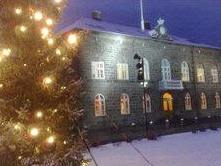 |
|
It is a sign of the
times that security has
been increased at
Reykjavik's small
Parliament building,
from one policeman to
three. Iceland's
Prime Minister Geir
Haarde faces almost
daily calls for his
resignation from small
but angry protests - and
has even been seen with
an armed bodyguard at
the gym. The crisis that
saw Iceland's three
largest banks collapse
in October also soured
relations with Britain.
And while Mr Haarde
insists "we need to move
on", he also insists his
government is
considering court action
against the UK. "I think
there's a special case
with regard to Kaupthing
which needs to be looked
into," he says,
referring to Iceland's
biggest bank which
collapsed on 9 October.
A decision on whether to
go to court is expected
by early January,
focusing on action by
the British authorities
to put the UK operations
of the bank's
subsidiary, Kaupthing,
Singer and Friedlander (KSF),
into administration. "We
are looking at whether
or not the action of the
FSA (Financial Services
Authority) led to the
collapse of Kaupthing,
Singer and Friedlander
in the UK, which in turn
led to the collapse of
the mother bank here in
Iceland," he says.
Iceland's financial
sector imploded over 11
unprecedented days.
First Glitnir, the
third-largest bank, was
nationalised on 29
September, then
Landsbanki, the
second-largest, was
taken over under
emergency legislation on
7 October. |
|
'We have saved the
world' |
|
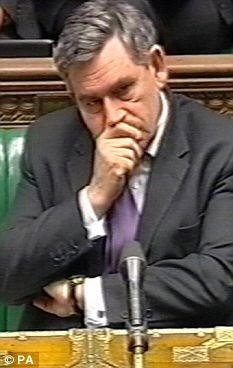 |
|
Gordon Brown's slip of
the tongue provoked
hilarity in the Commons.
Gordon Brown is
preparing to offer
billions in loan
guarantees to struggling
businesses amid Tory
claims that his bank
rescue scheme is not
working.
|
|
|
SPECIAL RELATIONSHIP? |
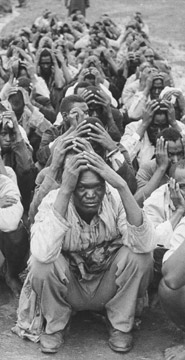 |
| Barack Obama’s
grandfather was imprisoned and brutally
tortured by the British during the
violent struggle for Kenyan
independence, according to the Kenyan
family of the US President-elect.
Hussein Onyango Obama, Mr Obama’s
paternal grandfather, became involved in
the Kenyan independence movement while
working as a cook for a British army
officer after the war. He was arrested
in 1949 and jailed for two years in a
high-security prison where, according to
his family, he was subjected to horrific
violence to extract information about
the growing insurgency. |
IMAMS
AND RABBIS GATHER TO PROMOTE
PEACE
 Paris,
15 December 2008, the Foundation
Hommes de Parole inaugurated the
Third World Congress of Imams
and Rabbis for Peace at UNESCO.
The theme of the Congress is
The Sacredness of Peace. Paris,
15 December 2008, the Foundation
Hommes de Parole inaugurated the
Third World Congress of Imams
and Rabbis for Peace at UNESCO.
The theme of the Congress is
The Sacredness of Peace.
Abdoulaye Wade, President of the
Republic of Senegal and
President of the Organisation of
the Islamic Conference and Mr
Koïchiro Matsuura, Director
general of UNESCO opened the
proceedings.
|
|
|
CHINA DEVALUES |
|
The central bank
has shifted the
central peg of
its dollar band
twice this week
in a calculated
move that
suggests Beijing
aims to offset
the precipitous
slide in Chinese
manufacturing by
trying to gain
further export
share abroad.
The futures
markets are
pricing in a 6pc
devaluation over
the next year.
"This is clearly
a big shift in
policy and we
are now on
alert," said
Simon Derrick,
currency chief
at the Bank of
New York Mellon.
The move follows
a Politburo
speech by
President Hu
Jintao warning
that China is
"losing
competitive edge
in the world
market".
|

|
Guy Ritchie
will receive
almost £50
million in
cash and
property in
what may be
the largest
divorce
settlement
paid to a
man, a
spokeswoman
for his
former wife,
Madonna,
said last
night. The
film
director and
the pop
singer were
granted a
divorce
settlement
in the High
Court last
month.
Ritchie, who
has an
estimated
fortune of
£30 million,
was
originally
reported not
to be asking
for any
money from
his
wealthier
wife, whose
fortune is
estimated at
£300
million. The
split, via a
“quickie”
procedure,
was held up
by lawyers
as a model
separation,
devoid of
acrimony,
and
Ritchie’s
apparent
refusal to
demand a
share of his
former
wife’s
fortune was
praised as a
rare act of
integrity.
Last night,
however,
Madonna’s
spokeswoman,
Liz
Rosenberg,
said that
Ritchie
would
receive a
figure of
between $76
million and
$92 million
(£49 million
and £60
million) in
cash and
property.
This
includes the
couple’s
country
home,
Ashcombe
House, in
Wiltshire.
worth an
estimated
£10 million
to £12
million, and
their West
London pub,
the
Punchbowl,
which they
bought for
£2.5
million.
Their
settlement
is about
twice the
amount that
Sir Paul
McCartney
paid to
Heather
Mills.
|
|
|
House prices likely to fall for up to
six years suggests latest research from
Harvard University Latest academic
study on impact of previous financial
crises suggests house prices have a long
way to go both in duration and magnitude
of fall (average of -36%). Authors say:
"An examination of the aftermath of
severe financial crises shows deep and
lasting effects on asset prices, output
and employment. Unemployment rises and
housing price declines extend out for
five and six years, respectively.” |
|
|
Anglo Irish Bank Nationalized |
|
The state had planned on
pumping 1.5bn euros (£1.4bn) into the bank, but
has decided that recapitalisation is not the way
to secure its future. Anglo Irish has about 100
billion euros on its books, but there was no
need for customers to act, the state said. It
added that all employees would stay with the
firm and that shareholder rights would be
protected. The bank's board said it would work
with the government to ensure its long-term
commercial viability. Ministers had been due to
hand over the 1.5bn euros bail-out in return for
75% shares with an annual fixed dividend being
paid to the government of 10%. "In the current
circumstances the State is the only available
potential owner," the government said. "I would
again stress that this government decision
safeguards the interest of the depositors of
Anglo, and the stability of the economy, given
the significance of Anglo in this regard, as
already recognised by the European Commission,"
said finance minister Brian Lenihan. "The bank
will continue to operate as normal and
depositors and creditors should continue to
transact as normal." A lack of liquidity has
made it increasingly difficult for the banks to
lend money to their customers. And confidence in
Irish banks has been undermined by the global
credit crunch. They have been especially badly
hit by a slump in the Irish property market
which has led to a collapse in the value of
investments linked to the property market. In
October the government of the Irish Republic
acted to shore up its financial system by
guaranteeing all deposits in the republic's
banks and all money borrowed by the banks from
other financial institutions. This led to many
savers in the UK putting money there as it came
before the UK government had boosted its
protection for savings. According to latest
figure released at the end of September, 50% of
the money saved with Anglo Irish came from UK
customers. Anglo Irish recently lost top
executives over a secret loans fiasco. In
December the bank's chairman resigned after a
87m euros loan controversy. Sean Fitzpatrick
confirmed that he had transferred millions of
euros out of the Dublin-based bank's accounts.
Chief executive David Drumm announced his
resignation shortly afterwards. |
|
POUND
STERLING FACING DIFFICULT DAYS |
| The pound is a currency with no underpinning
and should fall against the dollar and the euro,
says Jim Rogers, chairman of Rogers Holdings and
co-founder of the Quantum Fund with George Soros.
He says his view reflects the UK’s dire economic
situation: “It’s simple, the UK has nothing to
sell.” Mr Rogers says the two main pillars of
support for sterling have been North Sea oil and
the strength of the UK financial services
sector, in particular, the City of London’s
role. But Mr Rogers says just as North Sea oil
is running out, so London’s standing as a major
financial centre is set to suffer. “I don’t
think there is a sound UK bank now, at least, if
there is one I don’t know about it,” he says.
“The City of London is finished, the financial
centre of the world is moving east. All the
money is in Asia. Why would it go back to the
west? You don’t need London,” says Mr Rogers. Mr
Rogers thinks the pound is more vulnerable than
the dollar or the euro. He says the UK housing
market is arguably in a worse state than that of
the US, given pockets of strength in the US and
prices that are sliding across the board in the
UK. Meanwhile, he says, the UK is in worse shape
economically than the eurozone, where most
countries are not big debtors and do not run
huge trade deficits. “If the UK discovers more
North Sea oil, I might change this view,” he
says. “But I don’t see that happening.” The
controversial comments from the investor and
author came as fresh evidence emerged that the
UK’s economy is falling deeper into recession.
UK unemployment rose to its
highest level since 1997 in the three months
to November, while mortgage lending fell to a
fresh record low in December. New figures
released on Wednesday also showed
UK public finances were deteriorating.
December’s budget deficit – tax receipts minus
expenditure – totalled £11.4bn against a
shortfall of £4bn a year earlier, partly because
of the £20bn state recapitalisation of the Royal
Bank of Scotland which swelled the government’s
net cash requirement to £44.2bn. The pound,
which on Monday was trading as high as $1.4909
against the dollar, dropped to a low of $1.3713.
This was its lowest level in more than seven
years and just above the 23-year low of $1.3682
it hit in June 2001. The pound recovered some
ground to stand down 1.3 per cent at $1.3730 by
late morning in New York. Sterling also fell 1.1
per cent to £0.9370 against the euro and lost
3.8 per cent to a record low of Y120.16 against
the yen. Meanwhile, the minutes of the Bank of
England’s
January meeting did nothing to support
sterling, showing that eight members of its
nine-strong Monetary Policy Committee voted for
a 50 basis point cut in interest rates with the
one dissenter voting for a more aggressive 100
basis-point move. The pound has fallen sharply
this week, losing more than 7 per cent against
the dollar, amid uncertainty over government
attempts to bail out UK banks and fears of a
creeping nationalisation of the sector. Analysts
said given the UK bank bail-out had failed to
help lift investor sentiment, unorthodox
monetary policy steps looked more likely from
the Bank of England now that interest rates were
approaching zero. |
|
|
|
|
GAZA CONFLICT |
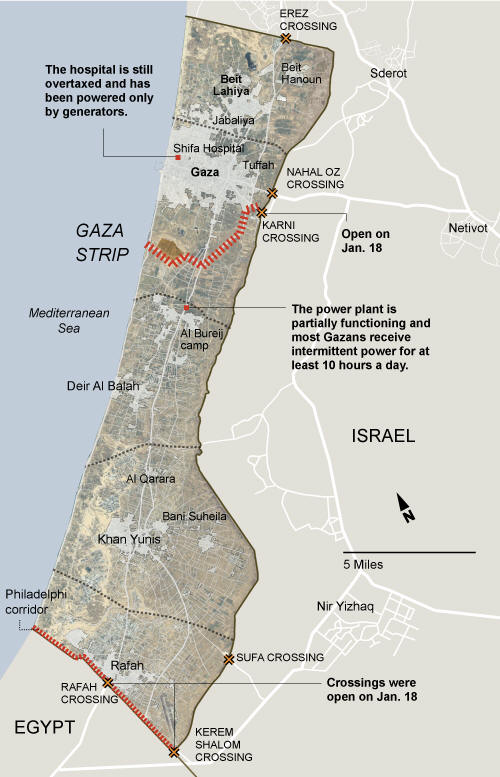 |
|
Hours after
Israel
declared a
cease-fire
on Sunday,
Hamas
declared one
of its own,
announcing
that Israeli
forces had
one week to
leave Gaza.
Still,
Palestinian
militants in
Gaza fired
at least 15
rockets at
southern
Israel,
including a
couple after
the militant
groups’
cease-fire
was
announced.
Most landed
without
causing
casualties,
but one
struck a
house in the
Israeli port
city of
Ashdod,
lightly
wounding one
person. More
than 1,300
Palestinians
died and
5,000 were
wounded.
Israel
unilaterally
called off
its
offensive,
political
leaders and
the military
have
emphasized
that Israel
would
respond to
any attacks.
Israeli
forces
remain in
the north
and south of
Gaza and
along the
eastern
border. The
United
Nations has
reported
that forces
have begun
to withdraw
from some
areas in
Gaza
City
and
Rafah
after the
cease-fire.
Last Sunday,
aid workers
said they
recovered
100 bodies
from areas
where the
Israeli army
has left.
The number
of dead is
expected to
rise as the
army
completes
its
withdrawal
and aid
workers are
able to
access
damaged
buildings.
|
|
UK CLOSING DOWN
SALE EVERYTHING MUST GO! |
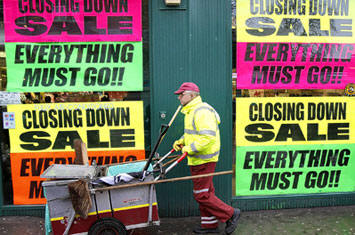
|
The London
Evening Standard
owned by Russian
Russian
billionaire
Alexander
Lebedev, former
Soviet spy, paid
just £1 for the
only remaining
London evening
newspaper The
Evening Standard
and said he
plans to pump
tens of millions
into it. The
paper reports
the British
economy is,
quote: ‘... bad,
but not as bad
as we fear ...
the news comes
at the end of a
week in which
we've seen yet
more banking
woes, further
job losses and a
dismissal of our
chances of
recovery from US
investment guru,
Jim Rogers.
Before you jump,
consider the
following. A
good major
business hasn't
gone down yet.
There's been no
failure that has
caused me to
pull up short —
all the
collapses that
dominated the
news are
predictable.
They were in
God's waiting
room anyway —
fewer customers
and a tightening
of credit is all
it took to send
them under.
Travel around
and some areas
of the country
seem far less
affected than
others. And
Bernard Lewis,
the founder of
River Island,
says today: “I
went into the
malls last
Saturday and
they were busy —
not just us. You
can go around
the shops and
think — what
recession? There
is simply no
evidence of it.”
In property, the
number of
would-be buyers
registering with
estate agents
has risen to its
highest since
2006. In the US,
there are
stirrings of
housing on the
move again. But
before I do a
Baroness Vadera
and hail the
arrival of green
shoots (since
the minister
uttered her
words and was
ridiculed, the
order has gone
out across
Whitehall to
keep quiet), it
may prove to be
illusory.
Certainly, in
the South-East,
the impact of
the shattered
City continues
to be felt. And
there are those
who think we're
another Iceland
in the making.
Among them,
Rogers. His view
that we're too
reliant on North
Sea oil is wrong
— as Royal Bank
of Scotland
points out,
we've been
running an oil
deficit for
years, well
before the last
drop from the
North Sea
expires. It's
not a big deal.
Likewise, his
claim that we
have nothing to
sell is also
misleading. UK
exports, RBS
reports again,
reached almost
30 per cent of
GDP in 2006-07.
The City, upon
which attention
is focused, is
not as vital as
is commonly
supposed. Given
a bust bank can
find reasons to
be cheerful says
it all. Yes,
we're in
recession but it
won't last
forever. When it
does, we may
just emerge
stronger and
certainly wiser.
I promise I
didn't write
this with my
fingers crossed.
There is cause
for optimism,
there is…’ |
|
|
HIC! DID YOU
SAY
ALKA-SELTZER? |
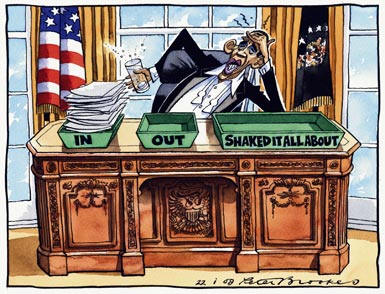
|
|
|
|
|
USA
AIDS AFRICAN STATE MILITARY |
|
Thousands of miles
from the battlefields of Iraq and
Afghanistan, another side of America’s
fight against terrorism is unfolding in
this remote corner of West Africa.
American Green Berets are training
African armies to guard their borders
and patrol vast desolate expanses
against infiltration by
Al Qaeda’s
militants, so the United States does not
have to. |
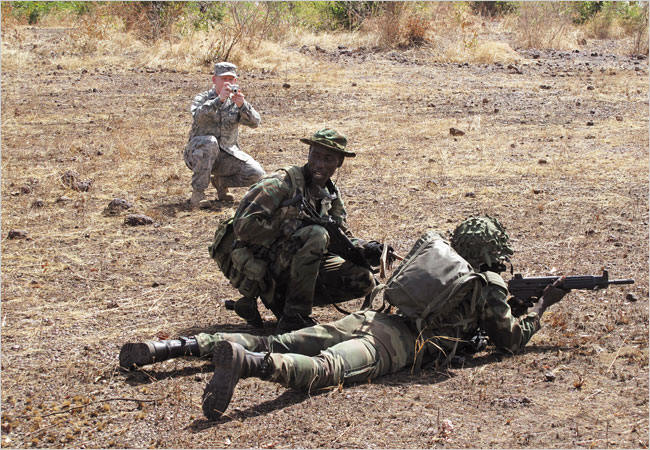 |
|
A recent exercise
by the United States military here was
part of a wide-ranging plan, developed
after the Sept. 11 attacks, to take
counterterrorism training and assistance
to places outside the Middle East, like
the Philippines and Indonesia. In
Africa, a five-year, $500 million
partnership between the State and
Defense Departments includes Algeria,
Chad, Mauritania, Mali, Morocco, Niger,
Nigeria, Senegal and Tunisia, and Libya
is on the verge of joining.
American efforts to fight terrorism in
the region also include non-military
programs, like instruction for teachers
and job training for young Muslim men
who could be singled out by militants’
recruiting campaigns. One goal of the
program is to act quickly in these
countries before terrorism becomes as
entrenched as it is in
Somalia,
an East African nation where there is a
heightened militant threat. And unlike
Somalia, Mali is willing and able to
have dozens of American and European
military trainers conduct exercises
here, and its leaders are plainly
worried about militants who have taken
refuge in its vast Saharan north. “Mali
does not have the means to control its
borders without the cooperation of the
United States,” Ibrahim Boubacar Keita,
a former prime minister, said in an
interview. Mali, a landlocked former
French colony that is nearly twice the
size of Texas with roughly half the
population, has a relatively stable,
though still fragile, democracy. But it
borders Algeria, whose well-equipped
military has chased Qaeda militants into
northern Mali, where they have adopted a
nomadic lifestyle, making them even more
difficult to track. |
|
|
POUND REGAINS LOST TERRITORY BUT
FOR TOURISTS ONE EURO EQUALS ONE POUND |
|
|
|
|
EMERGENCY AID
FOR EUROPEAN ECONOMY |
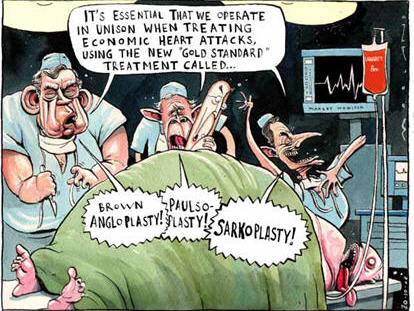
|
Prime Minister Gordon
Brown announced earlier this week a new
bailout for the British financial system
that increased government control over
lenders, saying it would offer banks
insurance on troubled assets. The
government also revised the terms of its
bailout of Royal Bank of Scotland,
raising its stake in the bank to 70
percent, from 58 percent. Governments in
Belgium, France, Germany, the
Netherlands and Spain have also
announced steps to bolster the capital
of their lenders. The continued economic
gloom extended to Spain, where the
National Statistics Institute said the
unemployment rate rose to 13.9 percent
in the fourth quarter, from 11.3
percent, which was already the highest
in the euro zone. The government said
last week that it expected unemployment
to rise to 16 percent this year, while
the economy would contract 1.6 percent.
Juan Carlos Martínez Lázaro, a professor
of economics at the IE Business School
in Madrid, said job losses had spread
from real estate and construction to
services and manufacturing, as consumers
spent less and Spain’s tourism season
ended. Mr. Martínez predicted that the
rise in unemployment would continue this
quarter, but ease in the second quarter
as local governments put into place an
8-billion-euro public works plan. “The
public works will help provide a lot of
jobs for four, five months,” he said.
“But it will only help up to a point.”
Still, there have been some slightly
more positive signs from the euro area
this week. An index of purchasing
managers on euro-area services and
manufacturing stood at 38.5 in January,
up from 38.2 in December, which was the
lowest reading since the survey began in
1998. Other reports this week — like the
January survey of consumer confidence in
Belgium and the ZEW survey on German
investor sentiment — have confounded the
more negative expectations of some
analysts. |
|
EURO
PUT STRAINS ON WEAKER ECONOMIES |
|
“The Italians, the
Spaniards, the Greeks, we all have been
living in happy land, spending what we
did not have,” said George Economou, a
Greek shipping magnate, contemplating
his country’s economic troubles and
others’ from his spacious boardroom. “It
was a fantasy world.” In Greece, another
of the euro zone nations in trouble,
stores like this one in Athens are
offering deep discounts to stay open.
For some of the countries on the
periphery of the 16-member euro currency
zone — Greece, Ireland, Italy, Portugal
and Spain — this debt-fired dream of
endless consumption has turned into the
rudest of nightmares, raising the risk
that a euro country may be forced to
declare bankruptcy or abandon the
currency. The prospect, however
unlikely, is a humbling one. The
adoption of the euro just a decade ago
was meant to pull Europe together
economically and politically, ending the
sometimes furious battles over who could
devalue their currency the fastest and
beggar their neighbour. |
|
|
|